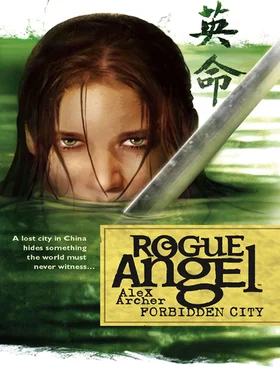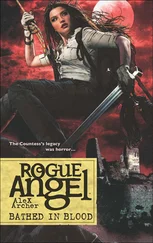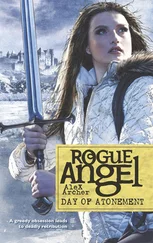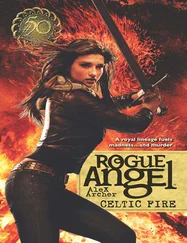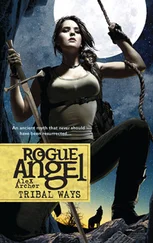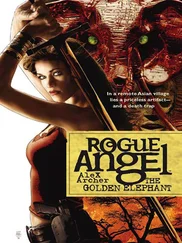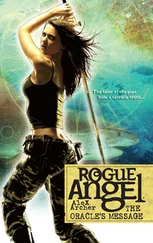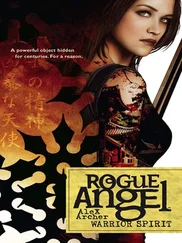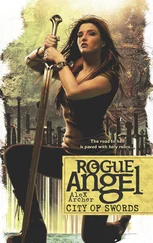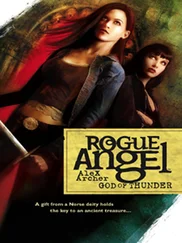Annja was all too aware that her own free time turned on a dime and was often gone before she knew it. She’d already turned down a Chasing History’s Monsters assignment to track down the legend of a vampire living in Cleveland. Vampires were perennial ratings winners on the television show, and her producer, Doug Morrell, had a special interest in them that she hadn’t quite figured out. Given her options, she’d jumped at the free trip to California.
Within minutes, Annja found the few remaining landmarks she’d identified from the stories and the geographical maps. Once she was oriented, she grabbed the straps of her backpack, hoisting it to one shoulder.
“Let’s go,” she said.
Huangfu fell into step beside her. “Do you know where the building we’re looking for is located?”
“I think so.” Annja pointed. “Chinatown was up on that ridgeline. Mining towns were usually segregated by race. Chinese immigrants poured into California in the 1850s and 1860s.”
“For the promise of gold. I know.”
“Not just for the promise of gold.” Annja started up the incline, grabbing an exposed tree root as she leaned into the ascent. “They were also escaping the Taiping Rebellion that occurred after the British defeated the Chinese in both Opium Wars to force British trade.”
“I’ll take your word for that, Miss Creed.”
Annja was surprised that Huangfu wouldn’t know that. Those times had been hard on the Chinese people. The British had usurped the emperor’s control and spread opium throughout Shanghai and other provinces through gunboat diplomacy.
The Chinese had invented gunpowder for fireworks, and had even used it somewhat for cannon and flamethrowers, but they had never mounted cannons on ships for use in war. The British had done that with success unmatched by any other nation.
Reaching the summit of the rise, Annja looked down, orienting herself again. She tried to imagine what the town had been like when it had been booming with the promise of gold. In San Francisco, which had been in its infancy when the Gold Rush had started, sailors had abandoned ships and left them sitting crewless in the harbor, chasing after the elusive promise of sudden wealth. Only later, after some of the prospectors had struck it rich and others had returned looking for work, had San Francisco grown into a huge port city.
Men had lived and fought, chased possibilities, drowned sorrows and died in a microcosm fuelled by dreams. Annja felt the history almost come alive around her.
She relished opportunities to go places and see them for herself. She’d never been to an abandoned mining town before. Even though it was only a hundred and fifty years old, not centuries or a millennia as many of her studies were, the history of the place touched her more than she thought it would.
She let go of the city and focused on the man she’d come there to find. She turned to face Huangfu.
“Your ancestor, Ban Zexu, arrived in San Francisco in 1872. I confirmed your research with my own. Most of the Gold Rush was over by 1855, but several strikes kept happening. Some of them took place here in Volcanoville.” Annja walked west along the ridgeline, seeing the layout of the buildings in her mind’s eye.
Huangfu followed her.
“He lived up here in Chinatown, overlooking Volcanoville proper. The Chinese immigrants weren’t allowed to mix with the white population.”
“But the shopkeepers took their gold for things they needed,” Huangfu said.
Annja nodded. “All of these towns were violent. Too many men were looking for too little gold, which had gotten harder and harder to find. In 1874, Chinese miners found a ten-ounce nugget at the Cooley Mine. Drunken miners locked over a dozen Chinese in the cabin at the mine and burned it to the ground with them inside. The men who escaped the fire were gunned down.”
“Was that where my ancestor was murdered?”
“No.” Annja walked along, studying the ground. “Ban Zexu was killed here. A few of the buildings in Volcanoville had root cellars where they kept potatoes and other perishable goods. Fewer still of the Chinese structures up here did. Your ancestor died in a house two houses down from one of the houses that had a root cellar made of rock according to the information I was able to find.”
Dropping her backpack to one side, Annja reached inside and took out an Army surplus trenching tool that snapped together and a metal rod with a handle. She pulled on a pair of leather work gloves.
“First we’ll find the stone foundation of the root cellar, then we’ll find the house where Ban Zexu died.”
She thrust the metal into the thick loam and got started, searching for stone. Thankfully, the early spring thaw had left the ground soft and easy to work. She only hoped the root cellar had truly been made of stone and wasn’t too deep to reach with the tools she was using.
I T TOOK LESS THAN AN HOUR to find the root cellar. Stepping off the measurements of the house, assuming that the cellar was under the center of the building and was entered from the back, Annja quickly located the area where she believed the building Ban Zexu had been murdered in had once stood.
She had stripped off her fleece-lined coat, finding it too hot to work in. Huangfu had divested himself of his jacket.
“Make sure you get plenty of water.” Annja uncapped her canteen and drank. “Cold will leave you as dehydrated as heat.”
Huangfu nodded and drank. Despite his exertions, he didn’t look any the worse for wear. One of his shirt sleeves crept up and revealed the red, yellow and blue ink of a large tattoo. It had scales, so Annja guessed that it was a dragon or a fish. Self-consciously, he pulled his sleeve back down, looking at Annja.
She acted as if she hadn’t seen the tattoo, but dark suspicions formed in her thoughts. She suddenly didn’t feel as comfortable and confident as she had.
“Here?” Huangfu pointed at the ground in front of her.
Annja nodded, capped her canteen, and picked up her trenching tool.
“How deep, do you think?” Huangfu shoveled like a machine.
“A foot or two at least. This far into the forest, foliage and dead trees are going to compost and add to the humus layer. If you leave anything on the ground long enough, nature has a tendency to pull it deep and cover it over.”
They dug rhythmically. The shovel blades bit into the earth and turned it easily.
Ban Zexu had suffered a harsh death that had mirrored the men who’d worked the Cooley Mine. Jealousy, fired by desperation, had turned the white miners against everyone else. Chinese and Mexican miners had become targets.
In 1875, little less than a year after the murder of the Cooley Mine workers, Ban Zexu and his small group of miners had been burned out, as well. The stories varied. Some said it was over a slight made by one of the Chinese miners, and others insisted it was over a woman. There was even a story that Ban Zexu and his friends had struck it rich, though no gold had ever turned up. Locked inside the building they’d lived in while working different claims, the Chinese miners had had no chance when the building had been torched.
As Annja worked, she tried not to think about that horrible death. Or about the tattoo she’d seen on Huangfu’s arm. She still wasn’t sure what that meant; only that Huangfu was more than he seemed, and that waiting for Bart to conduct a deeper background check might have been a good idea.
L ATE INTO THE DAY and almost three feet down, the light was fading fast and Annja’s certainty about her calculations was ebbing away as the dirt piled higher and higher. Suddenly her shovel struck burned wood. She saw the black coals stark against the lighter colored dirt.
Rotting wood would have been absorbed back into the earth. But the burned wood had been carbonized and would take longer to leach back into the soil and break down.
Читать дальше
